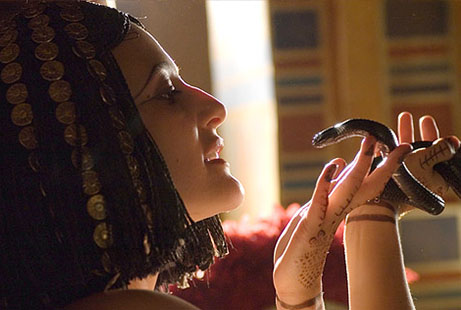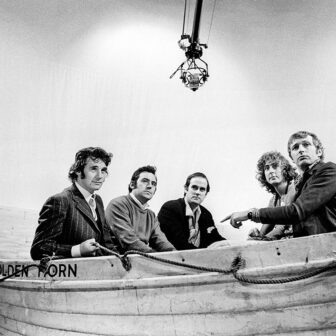Rome
Season Two | HBO/BBC | $79.95
A NEW EMPIRE is rising, even as the old free-to-air analogue model crumbles around us. According to the experts, the National Broadband Network will very likely spell the end for free-to-air commercial television in its current form. Kerry Packer, the last real emperor, is dead and his heir has abandoned the people (the audience) for the Casino industry. Yet we are seeing “television” like nothing before. In America and Britain they have dubbed it the New Golden Age. As with all serious empires, it seeks to be global in reach, standing on the highest platform it can find amidst the new media paradigm. For now, that platform is DVD (or BitTorrent, if you dare) but soon it will be IPTV video-on-demand.
What defines this Golden Age? First, it will stand the test of time; television now has a place in good bookstores opposite the Penguin Classics, not just as fleeting broadcasts. A Golden Age program must have a great plot and an opulent and convincing set. The historians will trace it back to “auteur” directors and writers who first explored the medium of the masses in series like David Lynch’s Twin Peaks and Dennis Potter’s The Singing Detective. Over time, popular drama has become increasingly elitist.
It seems fitting that early on in the New Golden Age, HBO and the BBC turned to Ancient Rome for material. The Romans had everything a television writer could ask for: corrupt power, weird sex and ritual violence. Even the politics was interesting. And, as Monty Python pointed out, the Romans undertook massively expensive enterprises such as roads and aqueducts.
Rome, the series, cost $US100 million per season (85 per cent from HBO, the rest from the BBC). The first season was screened on HBO and BBC1 in 2005–06 and the second in 2007. Having only got through two Caesars, a few more seasons must have been on the cards before it was all deemed too excessive.
In season two, the mostly British cast continue to cavort about the city and the Italian countryside in outrageous costumes and elaborate wigs. The men get leather chest plates to wear, swords to clean and horses to steal. The women are carried around by slaves, bathe in marble pools and complain about the salad. Almost every character ends up in bed with another – or gets their kicks with slaves, in orgy houses and (disturbingly) during torture sessions. Rome Season 2 is basically a good yarn with plenty of smut; the “ludicrous lifestyles of history’s rich and infamous.”
Putting aside all historical accuracy, season one’s success was largely due to a fictional parallel plot, involving two centurians, Titus Pullo and Lucius Vorenus (characters fleshed out from a brief mention in Julius Caesar’s writings). Vorenus (Kevin McKidd) and Pullo (Ray Stevenson) were well cast as the unwitting history-makers. Their clumsy actions led to the fall of Pompey Magnus and Julius Caesar’s glory (Kenneth Cranham and Ciarán Hinds). Together, the two soldiers embodied both the archetypal “pleb” (us) and the mythical warrior-hero. It was good to chuckle at Pullo’s laddish behaviour in season one, while Vorenus provided a worthwhile moral contrast to the out-of-control upper class characters.
In season two they have become lords of the underworld, helped along by their now established relationships with Caesar Octavian (Max Pirkis) and Mark Antony (James Purefoy). Rather than passing through history unaware, this time they are psychologically damaged and the drama of their lives has turned inward.
The main story, however, is the rise of Gaius Octavian. Unlike his uncle Julius, who won the hearts of the people and kept his enemies close, Caesar Octavian plays an overtly malicious game in the Senate and the home. The show’s best plot twist occurs when Octavian arranges a marriage that defies all family bonds and ultimately leads to Antony’s downfall. Having witnessed his boyhood in season one, we can believe in Octavian’s heartless actions in season two. The character, however, suffers the minor set-back of an actor changeover in episode four, when Pirkis is booted out for the older, more beautiful, Simon Woods. The younger Octavian was insipid and colder, his incestuous, repressive sex life quite convincing. Woods, although a fine actor, is framed with softly lit close-ups which make him almost too pretty to be a real villain.
Gaius Octavian’s rise occurs like a Generation Y takeover. He is absolutely a product of affluence, self-interested parenting and military school. With his entourage he leaves the matriarchs and senators looking old and stupid. Meanwhile, Gen X – Brutus (Tobias Menzies) and Cassius – become increasingly irrelevant (although Brutus stripping naked revives their glory momentarily). Octavian’s mother, Atia (Polly Walker), is a sadder figure in this season as she and her arch enemy Servilia (Lindsay Duncan) endure broken hearts, superstition and each other. Meanwhile, Atia’s trusty henchman, Timon (Lee Boardman), returns to his Jewish friends and cooks up a plot to kill King Herod. Although it was possibly intended as a substantial storyline for the unmade season three, the Jewish resistance ends on a silly note – unfortunately it’s the Judean People’s Front all over again.
If you think the city of Rome has become a soft-porn version of The OC, wait until you get to Egypt. Antony finds his Cleopatra (Lyndsey Marshal) wearing more eye-liner than fabric, and their destiny ends with a kind of night-club lock-in, involving lots of alcohol, drugs and the infamous adder. The great love story is hard to detect. By this point in the series Antony has been established as a TV sex symbol and it’s all about making him look as rockstar as possible. When the otherwise promiscuous Atia and Octavia (Kerry Condon) pay a visit to Alexandria, they look like two Toorak mums by comparison.
As enjoyable as all of this is, the real story of Rome – the corruption of a civilisation through sinister family dynamics – recedes into the background. There are a few smart little details to keep more serious viewers amused, such as the town crier, who finishes every news bulletin with a sponsorship announcement. Along with the graffiti in season one, this device serves to remind us that the media, too, has a history. Furthermore, the theme of illegitimate children is interesting, hinting that our own civilisation is really the accidental heir of Rome. In the second series, Titus Pullo spends his time protecting the future from those who seek to kill their children.
If you need to know what happens next in the land of Ancient Television, then you may turn to the BBC’s 1970s drama I, Claudius (based on the excellent book by Robert Graves), which begins where Rome leaves off. Octavian has declared himself Emperor and changed his name to Augustus. This time Augustus is the benign dictator, with Caligula taking on the role of the evil young upstart. In its day, and for a long time afterwards, I, Claudius was considered the very best of television (winning four BAFTAs in 1977). Rewatching it after Rome, poor old Claudius looks like high school theatre, with the indoor sets and stage acting antiquated in a bad way. But the two series together leave you wondering where television, and ancient Rome, will venture next…
Rome ended too soon. And although it’s not a very serious insight into the Roman Empire, it was a worthwhile and entertaining start to television’s New Golden Age. Mark Antony sums it up as he goes out to crush Brutus’s army: “This is how history is made. Now, let’s have some fun.” •
• Produced by HBO, the BBC and RAI. Created by John Milius, William Macdonald and Bruno Heller. Rome won the 2005 Golden Globe award for Best Television Series (Drama).




